




- BRNN
- BRI News
- BRNN News
- Database
Official Documents Polices and Regulations
Inter-government Documents International Cooperation BRI Countries
Business Guide Economic Data BRI Data
Trade
Investment Projects Latest projects
Cases - Content Pool
On the evening of December 1, 2020, the Xiangshan Forum Video Workshop was held in Beijing. Ezra Vogel, over 90 years old and the former Director of the Fairbank Center for Chinese Studies at Harvard, joined the event online. At such senior age, Vogel still continued his studies on China and closely followed the dynamics in China-US relationship.
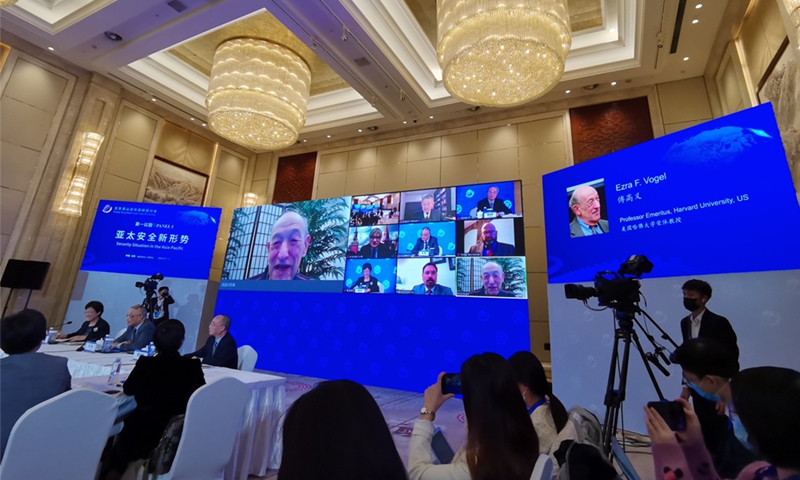
Ezra Vogel speaking at the Beijing Xiangshan Forum Video Workshops in December 2020
In his speech, Vogel said the US-China relationship was at a historical low which benefits neither of the two countries. He pointed out that the United States and China should strengthen communication at high and working levels, and between scholars and academics as well. He added that the United States should not denigrate China's constructive efforts in many parts of the world, such as its contributions to energy efficiency, infrastructure development in Africa and to COVID-19 response. He noted that the United States should recognize China's contributions to the world and treat China fairly.
At the time when China-US relations were beset by serious difficulties, such rational and objective views were indeed invaluable. Sadly, this forum was the last China-related event Mr. Vogel, known to all as a China expert, had attended. Only 19 days later, Mr. Vogel passed away, but his memory lives on.
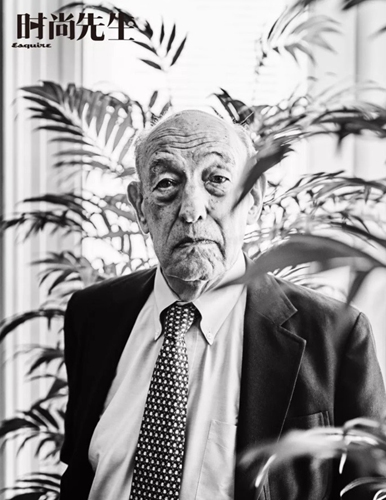
Esquire interviewing Ezra Vogel in Boston, August 2019.
Born in July 1930, Ezra Vogel was a true China hand. Gentle and graceful, he exudes an aura of a cultured gentleman. He gave himself the Chinese name Fu Gaoyi, which not just pronounced like his family name Vogel and but also embodied his life convictions. "Yi" in Chinese means high moral standard, something he had always aspired for.
Vogel began his education at Harvard as a student of sociology, focusing on family-related issues in America. He spent the two years from 1958 to 1960 in learning the Japanese language and doing research in Japan, turning himself into an expert on the Japanese society. In the 1960s, he began to learn Chinese and history at the Fairbank Center for East Asian Research at Harvard, and then became one of its earliest researchers on China. That group of scholars turned out to have long-lasting impact in the many years followed. Vogel once talked proudly about that experience, saying that only excellent students would be interested to pick up Chinese, which was so hard to learn and that those focusing on China, whether at the State Department or in universities or research institutes, were intellectual elites in the US.
In 1963, Vogel had a chance to visit Hong Kong. For the first time, he set foot on the land of China. In his one-year stay in the city, Vogel started to study contemporary China. He once recounted that during that period, he focused on China's overall development since 1949, including its politics, economy, and people's daily lives. He believed that China, with its big population and long history, would become more involved with the US and the rest of the world. He stressed that scholars like him, with no intention to hold back China's development but rather to seek more engagement with and knowledge about the country, knew that their studies would be an arduous task.
Having returned to Harvard from Hong Kong, Vogel set out to write a book about the development of Guangdong Province since the founding of the People's Republic of China. He delved into all the editions of the Southern Daily from 1949 to 1964, which laid solid groundwork for his following research. In 1969, he published Canton Under Communism: Programs and Politics in a Provincial Capital, 1949-1968. With an elaborate analysis on China's socialist transformation and the land reform, the book had filled a gap in American academia and was pretty influential in the United States.
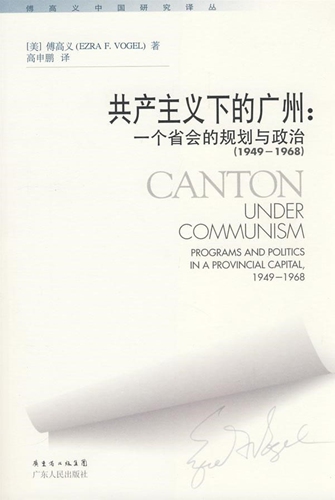
Canton Under Communism: Programs and Politics in a Provincial Capital, 1949-1968
The book had shown Mr. Vogel's laudable research style. He would never put himself on an ideological high ground and look down on or criticize his research subject. Instead, he observed and analyzed from an objective perspective, as a professional scholar. Vogel said that some Americans were vehemently opposed to communism, but most of the China researchers didn't, because they knew the purpose of research was not to criticize communism but gain a fuller and objective picture of it and discover the vigor and growth of the communist society.
When working on his book, Vogel opened a course on Chinese sociology, the first of its kind at Harvard, which focused on the Chinese mainland after 1949. Many of his students, such as Tu Weiming, have later become famous American scholars on China. Vogel also facilitated many visits between China and the US, and the well-known ones included visits by Chinese leaders Jiang Zemin and Wen Jiabao to Harvard.
In 1987, Vogel had another opportunity to gain insights into China. At the invitation of the Guangdong provincial government, he spent seven months in the province and visited more than 70 of the over 100 counties, 14 prefecture-level cities and the three special economic zones of Shenzhen, Zhuhai and Shantou. Through the field surveys, he gained fuller understanding about the province, which led to his book One Step Ahead in China: Guangdong Under Reform. In the book, he elaborated on the motive, nature, course and prospects of the reform and opening up in Guangdong. It became important reference for foreign scholars in studying China's reform, and together with the book published 20 years ago, constituted a complete review of Guangdong's contemporary history.
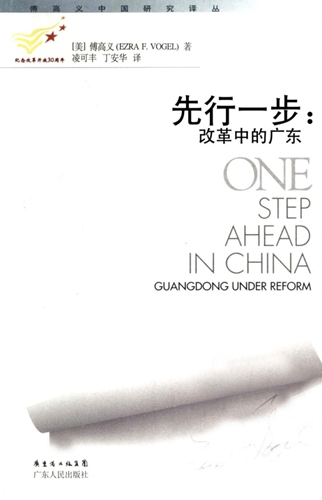
One Step Ahead in China: Guangdong Under Reform
Vogel continued writing books after retirement. In 2011, he published in the US Deng Xiaoping and the Transformation of China, a book he had devoted decade-long efforts. It recorded over a million publications and drew attention from both China and the West, regarded as a classic work on China's reform and opening-up and was written from an objective Western perspective. Throughout the 10 years in his writing, Vogel made a dozen trips to China. Every time he would stay for at least a week or two to do interviews with those who had personally interacted with Deng Xiaoping or experienced reform and opening-up and the offspring of the related Chinese officials. The book, with its abundant historical records and detailed interviews, draws a profile of Deng's personality and his style of leadership and gives a complete and distinctive account on China's history of reform and opening-up.
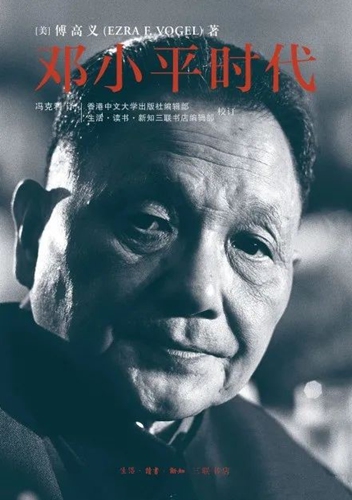
Deng Xiaoping and the Transformation of China
In Vogel's view, China had made a remarkable decision in 1978 to begin reform and opening-up, embarking on a path of rapid development. In his 1973 visit to China, Vogel saw a poor and backward country. Since the 1980s, he came to China at least once a year, and each time he found the Chinese living a better life. In an interview, Vogel said he didn't expect China to develop so fast and perhaps no foreigners did.
Vogel hoped that his book Deng Xiaoping and the Transformation of Chinacould present a real picture of China to more Americans. In the preface of the book, Vogel put it this way, "I hope the time of the publication may help more Westerners to try to better understand Deng Xiaoping and his reform as well as the changes taking place in China… I tried to hold an objective attitude towards what Deng had said and done and didn't conceal my admiration for him… I don't believe any state leader of any country has a greater influence on the development of the world."
In the words of Li Xin, chief editor of the book's simplified Chinese version, Vogel's book could be a legacy. It is a biography not of Deng Xiaoping but of China's reform and opening-up. Vogel's historic contribution is that he made clear how the Chinese society was transformed, where China's road began from and where it would lead to.
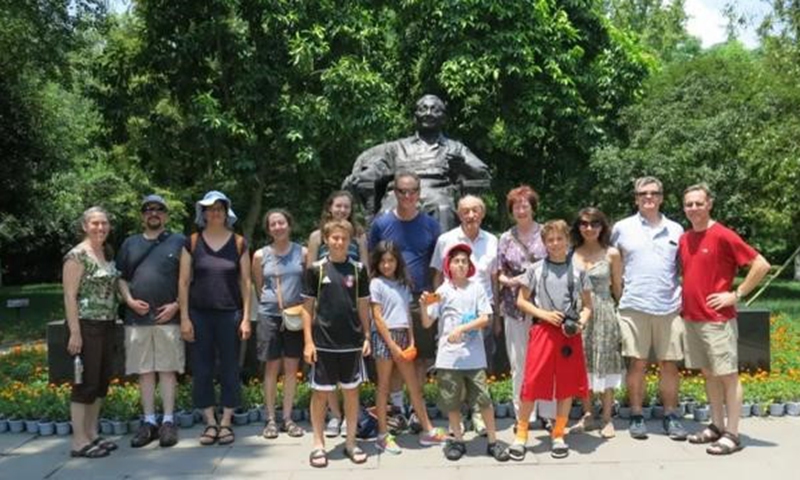
Ezra Vogel and his family taking a photo with Deng Xiaoping's statue
Ezra Vogel always worked to enhance exchanges and mutual understanding between the United States and China. He organized at Harvard weekly lectures on China to help Americans know more about the country across the Pacific. During Donald Trump's administration, the United States took unilateral actions and tough policies on China that gravely undermined bilateral relations. On multiple occasions, Vogel called on the administration to be rational and objective toward China and maintain and enhance dialogues and communications. He said that the relations between the two countries were so important and so consequential for the world that the two had no choice but to cooperate.
In July 2019, Ezra Vogel and Michael D. Swaine,among many others, jointly wrote an open letter titled "China Is Not An Enemy" published at the Washington Post. The letter says that hostility against China would not benefit the United States and that Washington "could end up isolating itself rather than Beijing." In a month's time, the letter was co-signed by over 200 personalities. In September 2019, Vogel attended a conversation organized by the China Institute in New York under the theme of "Is China the Enemy?", during which he made clear that the so-called "decoupling" was impossible and the two countries should keep in contact and dialogue to address issues in the bilateral relationship. In April 2020, together with around 100 former senior US government officials and academics, Vogel called on the US to work with China in COVID-19 response. In July 2020, Vogel published a signed article "U.S. Policies Are Pushing Our Friends in China Toward Anti-American Nationalism" in the Washington Post.
Vogel, on several occasions, pointed out that the obstacles in US-China relations were partially caused by Americans not knowing what to do with China's rapid growth. He noted that as China becomes more influential, even able to take the place of the US in some aspects, the US, somehow accustomed to calling the shots, finds it difficult to adapt. He also stressed that the US has to realize that China is not a country that would invade others, nor has it shown any intent to do so. What China wants, in his point of view, is to become a strong country respected by others.
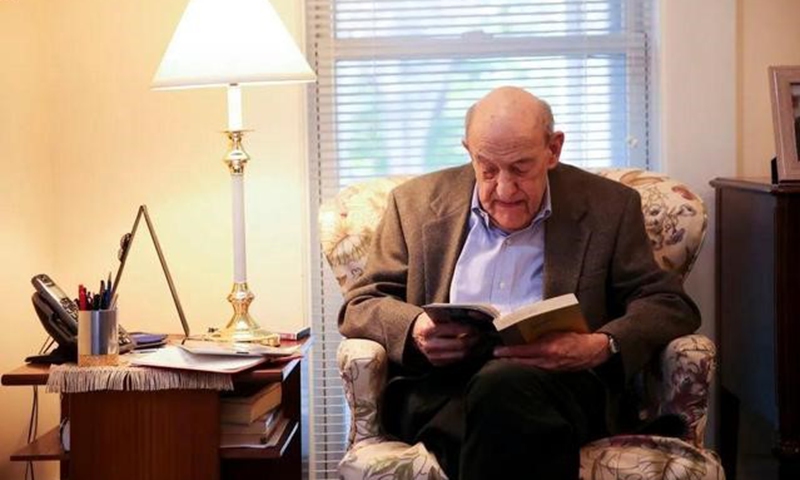
Ezra Vogel reading at home in Cambridge, May 16, 2019.
Ezra Vogel passed away at the age of 90 on December 20, 2020. Being a long-time friend of the Chinese people, Vogel poured his efforts into China-US relations till his late years. The Chinese Ambassador to the US Cui Tiankai tweeted to express his condolence on Ezra Vogel, saying "Throughout his lifetime he was dedicated to greater mutual understanding between the Chinese and American people and made significant contribution to their friendship and China-US relations. His wisdom and insight on China has been of immeasurable value not only to people in the field of study but also to the world." "I have known Professor Vogel for a long time and learned a great deal from him. I believe his ideas and commitment will always have an impact on us."
The Chinese people will remember Ezra Vogel's contribution to the development of the China-US relationship, his inclusive mind as well as his objective and truth-based academic style. His excellent contributions will benefit generations of Chinese and American researchers, and generate more "positive energy" for the development of the bilateral relationship. The Chinese people are convinced that the China-US relationship, as Vogel had wished, will return to the course of sound and steady development and continue to benefit the people of both countries and the world.
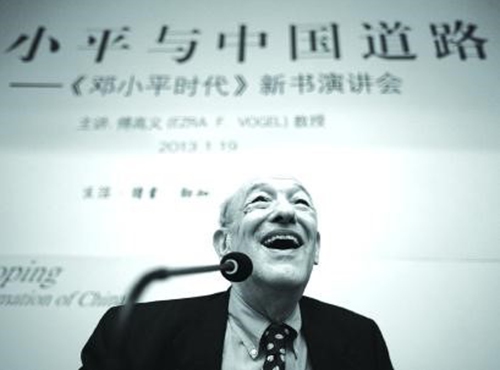
Ezra Vogel giving a lecture on Deng Xiaoping and the Transformation of Chinaat the National Library of China on January 20, 2013.

Tel:86-10-65368972, 86-10-65369967